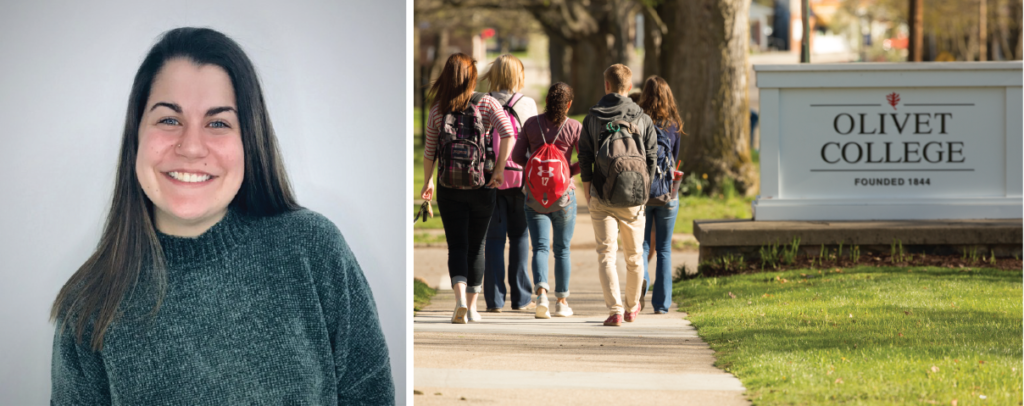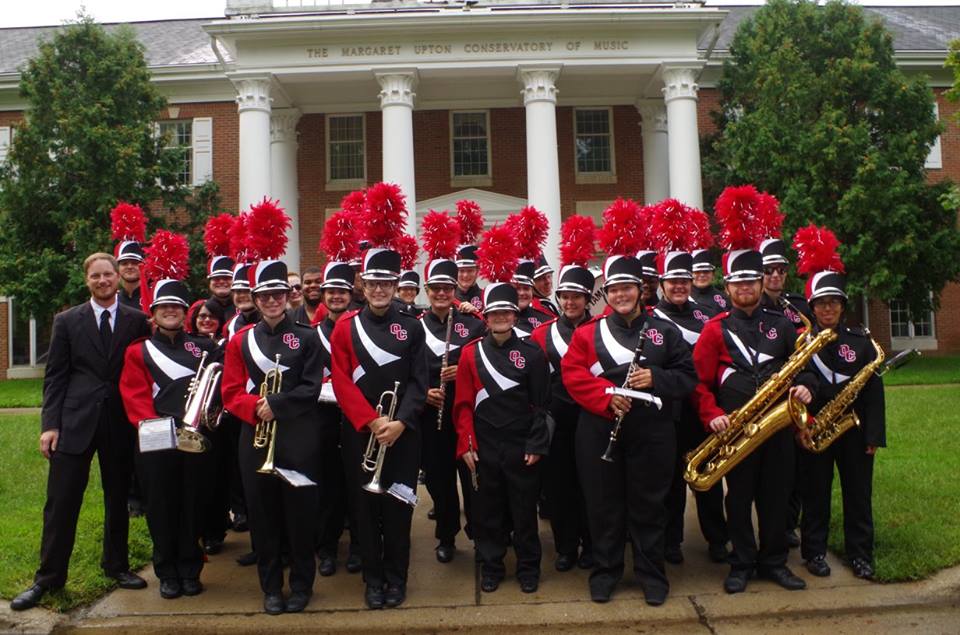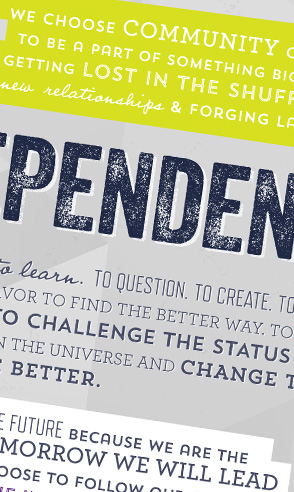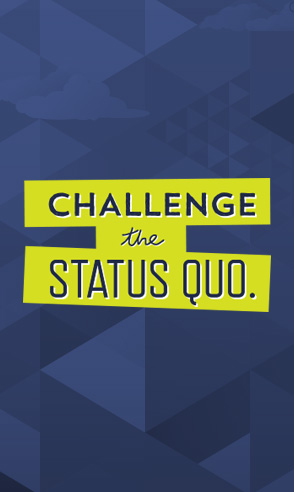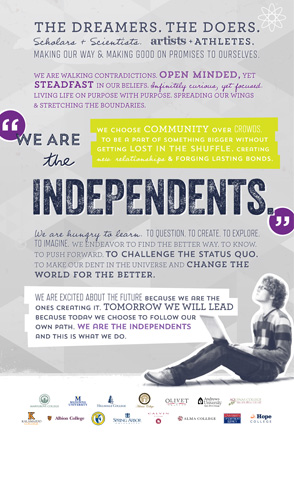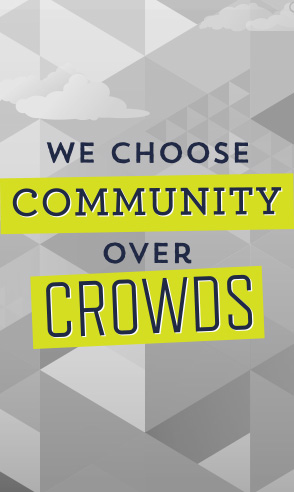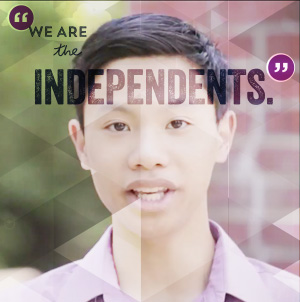Archive for
Aquinas College, the University of Detroit Mercy, Alma College and Olivet College among the nation’s top military-friendly schools
Originally posted at https://www.aquinas.edu/life-aq/posts/aquinas-college-named-one-nation’s-top-military-friendly-schools?fbclid=IwAR1xOvj_xPA0nMVZczsQoHRjQ4bk_6MrMCne3nSR-Alei64K8QmZ8i8bSXc
Aquinas College, the University of Detroit Mercy, Alma College, and Olivet College have each earned the 2021-2022 Military Friendly® School designation by Viqtory for their support of active-duty military members and veterans attending school.
The 2021-2022 Military Friendly Schools list is the longest-running and most comprehensive review of college and university commitment to serving military and veteran students. It helps service members and their families select schools that will provide education and training necessary to pursue a successful civilian career.
The list is published by Viqtory, a service-disabled, veteran-owned small business that connects the military community to civilian employment, educational and entrepreneurial opportunities through its G.I. Jobs and Military Friendly brands. The list will appear in the May issue of G.I. Jobs magazine and can be found at www.militaryfriendly.com.
“Military Friendly is committed to transparency and providing consistent data-driven standards in our designation process,” said Kayla Lopez, National Director of Military Partnerships at Military Friendly. “This creates a competitive atmosphere that encourages colleges to consistently evolve and invest in their programs. Schools who achieve designation show true commitment and dedication in their efforts. Our standards assist schools by providing a benchmark that promotes positive educational outcomes, resources, and support services that better the educational landscape and provide opportunity for the Military Community.”
Institutions earning the Military Friendly School designation were evaluated using both public data sources and responses from a proprietary survey. More than 1,200 schools participated in the 2021-2022 survey with 747 earning the designation.
Methodology, criteria, and weightings were determined by Viqtory with input from the Military Friendly Advisory Council of independent leaders in the higher education and military recruitment community. Final ratings were determined by combining the institution’s survey response set and government/agency public data sources, within a logic based scoring assessment. We measure the institution’s ability to meet thresholds for Student Retention, Graduation, Job Placement, Loan Repayment, Persistence (Degree Advancement or Transfer) and Loan Default rates for all students and, specifically, for student veterans.
Michigan’s independents recognize the importance of the sacrifices made by veterans, and make accommodations from mentoring programs and support services to ease the transition.
The colleges are purposefully small. Smaller class sizes allow passionate faculty to form bonds with students that just aren’t possible at larger universities. Instead of crowds, the colleges emphasize community. Often less expensive than public institutions, the independents boast higher four-year graduation rates and smaller class sizes for a truly unique and affordable experience.
Be bold. Be different. Go independent.
Make Your College Campus Visits, Virtually
While in-person admissions visits at Michigan’s top 14 private colleges and universities have been canceled due to the coronavirus pandemic, prospective students can still explore these beautiful campuses with the click of a button!
With virtual tours available, you can still get the chance to “walk” the campus, see and feel what life could be like for the next four years. The online tours not only give you a peak into each campus, but many schools even allow you to schedule an online information session with a live admissions counselor! Get your questions answered and make an informed choice now from the comfort of your home.
Get more information in the links below:
Alma College Virtual Tour | Schedule a Virtual Visit
Andrews University Virtual Tour | Sign up for a Virtual Preview
Aquinas College Virtual Tour | Schedule a Virtual Personal Visit
Calvin University Virtual Tour | Schedule a Virtual Visit
Hillsdale College Schedule a Virtual Visit
Hope College Virtual Tour | Schedule a Virtual Visit
Kalamazoo College Virtual Tour | Schedule a Virtual Visit
Madonna University Campus Tour Video | Schedule a Virtual Visit
Siena Heights University Virtual Tour
Spring Arbor University Virtual Tour | Schedule a Virtual Visit
University of Detroit Mercy Virtual Tour | Sign up for a Virtual Information Session
A Student Perspective: Sometimes Second is the Perfect Place
According to Olivet College rising senior Rose Kemmerling, the perfect college fit is defined by a homey feeling and awesome supporters. For her, Olivet College fits that description to a T.
Second Family, Second Home
“I would encourage a student to attend Olivet College because it is not just a place, but also embodies a great feeling,” Rose said. “When I come back to campus after summer or Christmas break, I feel like I am at my home-away-from-home. It is hard to explain, but once you are on campus you can feel the family atmosphere and know that it is the place that you should be. The College is more than just the academic buildings, dorm rooms and the KC — it’s the people who become your second family.”
As a biology pre-medical major, member of the volleyball team, President’s Leadership Institute fellow and vice president of the Student-Athlete Advisory Committee (SAAC), Rose’s second family is comprised of her teammates, science professors and classmates.
“My relationships with professors at Olivet have helped shape me into the person I am today. Being a biology major with a pre-med focus, Organic Chemistry was one of the classes I had to take,” Rose explained. “I established a bond with Professor Susanne Lewis, Ph.D., because I was with her four times a week in addition to a lab on Tuesday nights and the extra time I spent in her office hours. I know that her door will always be open and that I can go to her when needed.
“I also know that my coach, Megan Merchant, is someone that I can go to. I have the chance to work with her as both a coach and SAAC faculty adviser, and I know that she wants to see me succeed. My athletic trainer, Kaitlin Sznajder, is someone who I know will always be there to encourage and support me — she was my rock when I got a concussion this season.
“I am lucky to have teammates, friends and a support system all wrapped up into one.”
Rose added that a very special member of her OC family and volleyball team is nine-year-old Lianna Shearer. Liana was recruited to the Comets from Team IMPACT, a nonprofit that connects children facing serious or chronic illnesses with college athletic teams. Lianna attends practices, games, team dinners and other events with the team. More importantly, Rose and the rest of the OC volleyball team are members of Lianna’s support system as she overcomes challenges related to cystic hygroma.
Class of 2020
While Rose’s undergraduate journey at Olivet is nearing its end, she says she’s not done building relationships and using those connections for good. Next up, she’s preparing for further studies that will help her enter the medical field.
“I have always known that I want to do something in the medical field,” Rose said. “This past summer I read an article about genetic counseling, and I knew that this career was perfect for me. Genetic counseling does not only allow me to help others, but it still allows me to be involved in the medical field and solving problems. My goal is to attend a two-year genetic counseling program after graduating from Olivet. I am preparing myself for my future career by shadowing genetic counselors, taking prerequisite courses for my program, adding a psychology minor, participating in crisis volunteering and studying for the GRE.”
With the support of her OC family, Rose has no doubt she’ll be able to achieve her goals.
“My experience as a Comet has helped shape me into the person, student and athlete I am today. I have gained life experiences and learned lessons that I will carry with me throughout my life,” she concluded.
Learn more about Olivet College by contacting the Office of Admissions at 800-456-7189 or admissions@olivetcollege.edu.
When is the best time to visit colleges?
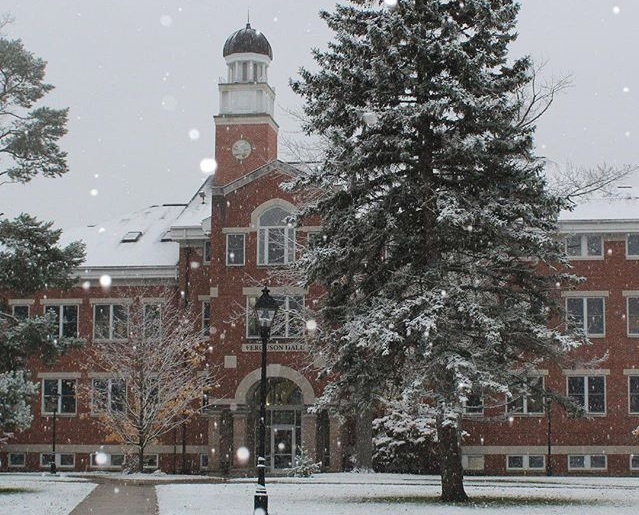
(Albion College, voted 12th Most Beautiful College in Winter)
It’s winter, and the tundra is setting in – at least it is here in Michigan. The last thing you are thinking about is planning a trip to visit campuses. Those long walks across snow-covered quads are certainly less appealing when the temperatures are teetering at the same level as the number of layers you’ll be wearing to stay warm. Or maybe you are a freshman or sophomore, and it’s just “not time yet.”
So, “When is the best time to visit?” The answer may not be what you expect. Here are some tips for getting the most out of campus visits:
Time of year:
As summer strolls in and the school year winds down, families across the country are gearing with plans to visit college campuses. Tours are crowded, staff is minimal, and quads are relatively barren. Although the summer months are more convenient for your time, ideally you should try to plan your visits when classes are in session and the campuses are full of life. Think of it like trying on a pair of new shoes: do you get the proper assessment while sitting? No, you get up, walk around, and perhaps jog in them… as it should also be done visiting campuses. Simulate the day-to-day as if you are attending the school. It doesn’t necessarily mean go in the dead of winter, but consider this: it may be cold, but it’ll also be cold while you attend, won’t it?
Age of student:
It can be very rewarding to visit colleges and universities before your junior and senior year (read: before it’s decision time). You are less concerned about choosing and “buying” when you are simply “window shopping” and more interested in checking out the inventory. Expose yourself to as many different kinds of places—big schools, small schools, research universities, liberal arts colleges, urban campuses, places way out in the country—to develop a broad perspective of all the different options. Then, when it is time to make a decision, you’ll have a better foundation on which to choose.
Before stepping foot on the first campus (and each one after that…):
Your new mantra: Relax, enjoy, decide later. Resist the impulse to judge immediately, good or bad. Your first reaction is bound to be emotional, and usually overly positive—college is really cool! Sleep on it. Weigh your impressions against the other schools you visit and try to remain as objective as possible so your rose-colored glasses don’t allow you to overlook things.
How to choose:
As you visit the campuses, allow your senses to guide you. Really like something? Take note of it. Feel like something’s missing? Take note of it. Gut instinct is usually pretty accurate. Additionally, the perceptions from your visits will come in handy when completing your college applications. Remember this: tying personal experience to the campus environment will blow the minds of the admissions department!
What to look for:
Focus on fit. We perform at our best when we have a level of comfort, belonging, and value. Questions to ask yourself: How does the college meet my academic needs? Will I be challenged appropriately? Is the style of instruction a good match for how I learn? Does the college offer a community that makes me feel “at home?” Does the college offer extracurricular activities that interest me?
After the visit, before you leave:
Connect with the recruiter. Colleges and universities typically assign admissions personnel to different areas of the country for recruiting efficiency. If your area’s recruiter is available, definitely introduce yourself. Either way, get that person’s contact information. Consider him/her as your “go to” person when you have important questions later in the admissions process. And remember this: there is nothing insignificant nor too embarrassing to ask. The admissions staff is there to help!
What to do next:
Record your visit. Make notes as soon as you are able. The more campuses you visit, the more they will begin to blend together, especially from memory. Take pictures to give yourself a visual index of what you’ve seen to avoid confusion later.
And finally:
Enjoy the process. It can be easy to get lost in the excitement and have that energy turn into anxiety. Relax. Start the search early. Visit during the school year to witness the campus’s true environment. Trust your senses and take notes.
As you map your college visit road trip, include a few of Michigan’s top 14 private colleges and universities on your list. These schools are purposefully smaller and emphasize “community over crowds.” Often comparable in cost to Michigan’s public institutions, the independents boast higher four-year graduation rates, outstanding faculty who help students forge their own paths, and smaller class sizes for a truly unique and personal experience.
Be bold. Be different. Go independent.
Kalamazoo Promise Makes Private Education Within Reach
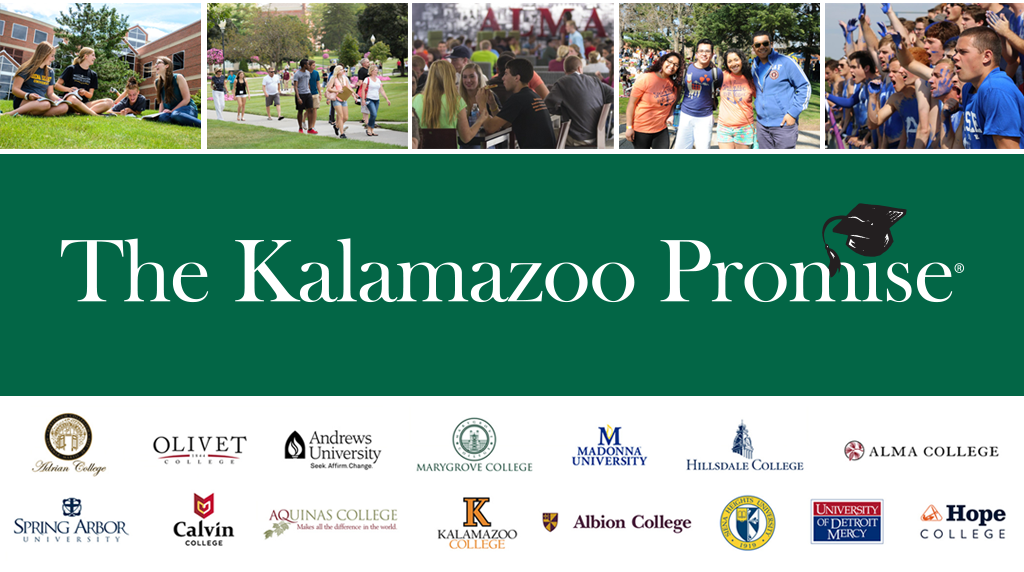
Almost everyone nowadays can cite scary statistics when it comes to the cost of college education.
Nationwide, the average annual tuition at private schools has more than tripled in 30 years jumping to $32,405 this year, according to inflation-adjusted statistics from the College Board.
But the cost of an elite private school education is nothing for students in Kalamazoo public schools.
You read that right.
The cost of Michigan’s 15 independent colleges and universities is zero for students who graduated from Kalamazoo Public Schools and attended since kindergarten. Graduates who attended since at least seventh grade will receive 75 percent of their tuition.
The Kalamazoo Promise is a revolutionary program that is changing lives and putting college in reach for 5,000 eligible graduates since it was launched and funded by anonymous donors in 2005.
The schools now send 85 percent of students to college, whose graduates can expect to earn $1 million more over their lifetime than peers whose education stopped at high school.
And what an education they can get, especially at Michigan’s independents: Adrian College, Albion College, Alma College, Aquinas College, Calvin College, Hillsdale College, Hope College, Kalamazoo College, Marygrove College, Olivet College, the University of Detroit Mercy, Andrews University, Madonna University, Siena Heights University and Spring Arbor University.
The schools pride themselves on helping students forge their own path. Classes are taught by professors, not teaching assistants, with average class sizes of just 17.5 students.
The independents open doors to a host of careers, from business and engineering to education and nursing, supported by a nurturing network of alumni who have become leaders in their fields.
And the independent colleges look like the world around them. One in 4 students at Michigan private colleges and universities is African American, American Indian, Asian, Hispanic or Latino.
Be bold. Be different. Go independent.
Michigan Private Colleges Rank High in Social Mobility
Study after study has shown that college not only transforms minds, but it lives as well as wallets.
College graduates make 25 percent more per week than the national average, and unemployment rates are significantly lower the more education is attained, according to the Bureau of Labor Statistics.
In short, college is “a ticket to the middle class,” according to Bridge Magazine.
But getting admitted to one and finishing are two different things, and it’s no secret that some colleges do far better jobs of helping low-income students graduate and get jobs.
The online magazine analyzed federal data to rank colleges on how they promote social mobility — offering tuition breaks, mentors and other aid for low-income students, as well as how long it took them to narrow the income gap with rich students after graduation.
The results? Michigan’s small, private colleges ranked the near the top.
Adrian College was the top-ranked private college in the state, enrolling the seventh-highest percentage of low-income students and graduating nearly 60 percent of them.
Madonna University was not far behind, offering low tuition for low-income students (less than $9,000) and helping them make similar salaries with high-income students 10 years after enrollment.
Olivet College and Spring Arbor University were near the tops in enrolling poor students, while Alma College, Hope College and Calvin College ranked in the top six in graduation rates.
Kalamazoo College, inexplicably, was left out of Bridge’s analysis altogether. But using its metrics, would have scored in the top 10 for graduation rates and average earnings.
The rankings reflect a deep commitment by Michigan’s top 15 private colleges and universities to improving the lives of all students and offering a path to improve lives.
Contrary to popular belief, tuition is on par with many public universities. That’s because students receive far more financial aid. At most of our schools, more than 93 percent receive aid, bringing the cost of a world-class education within reach.
Students at Michigan’s independents typically graduate in four years, rather than five or six at public schools. That means they are earning a salary while their peers at big state universities are wracking up more student debt.
That also means they have a two-year head start on their careers, which is yet another way Michigan independents help students forge their own path.
Be bold. Be different. Go independent.
Olivet College Marches to Own Beat on Gridiron
This football season, when the Olivet Comets hit the field, fans won’t be the only ones making noise.
For the first time in more than 30 years, the college’s marching band will as well.
Call it sweet harmony or simple good fortune, but the band was reformed as a part of a conscientious effort to increase the sense of community at the Michigan school, says director of bands Jeremy Duby.
“The marching band really is the center of student life and school spirit, and so it really adds a whole other atmosphere to the football game,” he recently told the Detroit Free Press.
“It’s a much bigger way for us to support our team and to get the entire community involved and make that game a community event every Saturday.”
The band is starting this year with 25 students and will play at all football games, campus events and a New Year’s Day parade in Paris, France. Duby predicts it grow to about 100 members within five years — and become an ingrained part of life at Olivet.
“This is a great part of the college experience,” says an Olivet College alum who was a member of the band in the 1970s.
The move is part of a trend among smaller colleges, including those at Michigan, to invest in athletic facilities, clubs and other extracurricular activities. That’s because big public universities don’t have a monopoly on sports — or fun.
Indeed, that’s one key difference between big universities and Michigan’s top 15 independent colleges and universities.
Class sizes are small enough so students not only know their professors, they form lifetime bonds. Professors pride themselves on working closely with students to help them forge their own path, buck conventional wisdom and find a new way.
It’s an experience that simply isn’t available at traditional universities. And despite what you may have heard, independents are often less expensive and boast higher four-year graduation rates than four-year institutions.
Be bold. Be different. Go independent.
Pure love of sports fuels student athletes in Division III
It’s no secret college sports are big business. College football alone recorded more than $3.4 billion. That’s a hair less than the gross domestic product of the entire nation of Barbados.
It’s little wonder, then, that many folks are cynical about college sports. Some athletes don’t even pretend to be students. There’s one controversy after another, from recruiting and pay-to-play violations to players leaving after a few seasons for the pros.
There is a place, though, where college athletics are untainted. It’s Division III, some 440 colleges and universities nationwide where competition and tradition are just as fierce as bigger universities, but student athletes play for a novel motivation: The love of the game.
“Division III athletics is the purest form of intercollegiate competition,” according to Psychology Today.
“Student-athletes are truly students first. Players are talented, competitive, and driven, but also know that they are in school to pursue an education, prepare for a career, and to develop socially, physically, spiritually, and intellectually.”
NCAA regulations bar student-athletes from receiving athletic scholarships, but that doesn’t mean they don’t receive help. Division III colleges offer grants and other financial aid packages, so students often end up with a large portion of their tuition paid.
That’s particularly true at Michigan’s top 15 independent colleges and universities, where more than 95 percent of students receive aid – from leadership scholarships to academic fellowships to educational grants. That brings the costs of a world-class college within reach — a priceless education that is affordable.
And the rivalries, talent and level of competition at Division III? That’s the stuff of legend, especially among the seven Michigan colleges in the Michigan Intercollegiate Athletic Association.
Since 1990, the schools have won 18 Division III national titles. And few streaks in all of sports are as impressive as the Kalamazoo College men’s tennis team, which has won or shared every division championship since 1936, while Calvin College’s men’s cross country has won 21 straight division titles.
Calvin College and Hope College are such bitter foes that ESPN recently named it one of college basketball’s greatest rivalries. Kalamazoo College and Olivet College also have a deep rivalry that dates back decades.
College athletics is just one difference between big public institutions and Michigan’s top 15 independent colleges and universities.
All share a commitment to helping students succeed by following their own path. The colleges are smaller and emphasize community over crowds. Often less expensive than public institutions, the independents boast higher four-year graduation rates and smaller class sizes for a truly unique and affordable experience.
Be bold. Be different. Go independent.
Sweet Science: Olivet College Prof is Chocolate Guru
When researchers in Ghana announced a new way to make chocolate more nutritious, the media knew just who to call: Olivet College’s famed Doc Choc.
You heard that correctly.
Patrick Fields has been a biology professor at the school since 1998. He’s a master botanist, a serious student of sand (more on that later) and renowned expert in paleoecology and paleogeography — the types of plants and terrain that were around when dinosaurs roamed the earth.
He’s known in pop culture, though, as the go-to authority of all things chocolate.
Regularly quoted on TV and magazines about chocolate, Fields has more than just a sweet tooth. He meticulously studies variations of the Theobroma cocoa — the small evergreen known as the cocoa tree whose seeds are used to make chocolate.
“There’s complexity on all levels: its chemistry, people’s response to it, the complexity of all the kinds offered,” Doc Choc says in one of several talks about chocolate.
It’s an interest he traces to his childhood in Palo Alto, California, where loved Hershey’s and See’s Candies. During that time, he also fell in love with sand. Yes, the kind that gets in between your toes at the beach. He’s an avid arenophile – a sand collector – searching the world for samples of ancient and modern sand and trades it with other collectors.
The affection isn’t limited to scholarship — although he has served as president of the Michigan Botanical Foundation and on the board of the Doty Native Wildflower Association.
Fields also writes poems about chocolate and sand.
That’s the sort of passion that thrives at Olivet and other Michigan independent colleges and universities. Their faculty don’t just know subjects. They live it and love it. And they cherish sharing it with students.
Awesome faculty is just part of what makes Michigan’s top 15 independent colleges and universities unique. They’re smaller and emphasize community over crowds. Often less expensive than public institutions, the independents boast higher four-year graduation rates and smaller class sizes for a truly unique and affordable experience.
Be bold. Be different. Go independent.


